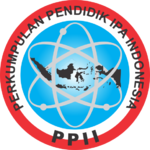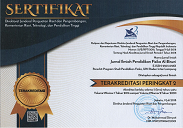Physicists research practices: A perspective to rethink inquiry-based science education
Abstract
Keywords
Full Text:
PDFReferences
Abd-El-Khalick, F. (2013). Teaching with and about nature of science, and science teacher knowledge domains. Science and Education, 22(9), 2087–2107. https://doi.org/10.1007/s11191-012-9520-2
Adams, S. W. (2007). The relationship between understanding of the nature of science and practice: The influence of teachers’ beliefs about education, teaching and learning. International Journal of Science, 28(8), 919–944. https://doi.org/10.1080/09500690500498351
Ajchenbaum-Boffety, B., Chevalérias, F., Chomat, A., Desbeaux-Salviat, B., Ernst, S., Jasmin, D., Larcher, C., Renoux, Y., Saltiel, E., & Sarmant, J-P. (2000). La main à la pâte et plan de rénovation de l’enseignement des sciences et de la technologie à l’école, Guide de découverte. INRP.
Albe, V., & Orange, C. (2011). Sciences des scientifiques et sciences scolaires. Recherches En Didactiques Des Sciences et Des Technologies, 2, 19–26. https://doi.org/10.4000/rdst.270
Angelo, M. D., Coquidé, M., & Magneron, N. (2012). Statut de l’investigation dans des standards del’enseignement scientifique: Cas des USA, de la Suisse etde la France. In B. Calmettes (Ed.), Didactique des sciences et démarches d’investigation: Références représentations, pratiques et formations. L’Harmattan.
Bächtold, M., De, L., & De, L. (2012). Les fondements constructivistes de l’enseignement des sciences basé sur l’investigation. Tréma, 38, 1–25.
Balacheff, N. (2014). cK¢ , a model to reason on learners’ conceptions. Conference: Psychology of Mathematics Education, North American Chapter, November 2013.
Boilevin, J.-M. (2018). La démarche d’investigation: Simple effet de mode ou bien nouveau mode d’enseignement des sciences ? Epistémologie & Didactique, December, 195–220. https://doi.org/10.4000/books.pufc.11422
Boilevin, J. M. (2013). La place des démarches d’investigation dans l’enseignement des sciences. In M. Grangeat (Ed.), Les enseignants de sciences face aux démarches d’investigation. Des formations et des pratiques de classe. PUG.
Calmettes, B. (2012). Didactique des sciences et démarches d’investigation. Références, représentations, pratiques et formation. L’Harmattan.
Cariou, J.-Y. (2011). Histoire des démarches en sciences et épistémologie scolaire. RDST - Recherches En Didactique Des Sciences et Des Technologies, 3, 83–106. https://doi.org/10.4000/rdst.386
Carlson, P. M. P., & Bloom, I. (2005). The cyclic nature of problem solving : an emergent multidimensional problem- solving framework. Educational Studies in Mathematics, 58(1), 45–75. https://doi.org/10.1007/s10649-005-0808-x
Coquidé, M., Fortin, C., & Rumelhard, G. (2009). L’investigation: Fondements et démarches, intérêts et limites. Aster, 49, 51–77. https://doi.org/10.4267/2042/31129
Cross, D., & Grangeat, M. (2014). Démarches d’investigation: Analyse des relations entre contrat et milieu didactiques. RDST - Recherches En Didactique Des Sciences et Des Technologies, 10, 169–192.
Driver, R., Asoko, H., Leach, J., Mortimer, E., & Scott, P. (1994). Constructing scientific knowledge in the classroom. Educational Researcher, 23(7), 5–12. https://doi.org/10.1163/26660644-06604003
Duschl, Richard A., & Grandy, R. (2013). Two views about explicitly teaching nature of science. Science and Education, 22(9), 2109–2139. https://doi.org/10.1007/s11191-012-9539-4
Duschl, Richard, A., & Grandy, R. E. (2008). Teaching scientific inquiry: Recommendations for research and implementation. Sense Publishers.
El Hage, S., & Plé, E. (2016). Démarches d’investigation en sciences : Des références épistémologiques questionnées au regard de la science qui se pratique. 9e Rencontres Scientifiques de l’ARDiST, 388–393.
Eurydice. (2007). Science teaching in schools in europe policies and research. In Education Journal (Issue 106). Commission, European.
Grangeat, M. (2016). Dimensions and modalities of inquiry-based teaching: Understanding the variety of practices. Education Inquiry, 7(4), 421?442. https://doi.org/10.3402/edui.v7.29863
Hage, S. El. (2021). Relation entre l’activité de recherche et d’enseignement des enseignants-chercheurs en physique. Une entrée par l’usage des ressources.in J.-M. Boilevin et A., Jameau (Eds.), Actualité des recherches en didactique des sciences et des technologies. Rencont. ARDiST.
Hage, S. El, & Ouvrier-Buffet, C. (2018). Les démarches de chercheurs en physique et en mathématiques. Enjeux didactiques d’une nouvelle approche épistémologique. Recherches En Éducation, 34, 1–21. https://doi.org/10.4000/ree.1932
Hagège, H. (2016). La démarche scientifique: invariants et spécificités disciplinaires - une approche épistémologique. IREM de Montpellier.
Hervé, N., Panissal, N., & Cancian, N. (2021). Quelles références pour enseigner la transition agroécologique ? Étude de discours de chercheurs sur leurs pratiques scientifiques. Education & Didactique, 5(2), 103–123.
Jameau, A., & Boilevin, J.-M. (2015). Les déterminants de la construction et de la mise en œuvre de démarches d’investigation chez deux enseignants de physique-chimie au collège. Recherches En Éducation, 21, 108–120. https://doi.org/10.4000/ree.7545
Lederman, N. G., & Lederman, J. S. (2019). Teaching and learning nature of scientific knowledge : Is it Déjà vu all over again ? Disciplinary and Interdisciplinary Science Education Research, 1(6), 1–9.
Marshall, J. C., Smart, J. B., & Alston, D. M. (2017). Inquiry-based instruction: A possible solution to improving student learning of both science concepts and scientific practices. International Journal of Science and Mathematics Education, 15(5), 777–796. https://doi.org/10.1007/s10763-016-9718-x
Maurines, L. (2013). Les programmes de sciences du lycée en France et la nature des sciences: Rapport à la vérité, aux croyances et à la culture. In G. Zoïa (Ed). Actualité de La Recherche En Éducation et Formation (AREF) Conference.
Maurines, Laurence, & Beaufils, D. (2013). Teaching the nature of science in physics courses: The contribution of classroom historical inquiries. Science & Education, 22(6), 1443–1465. https://doi.org/10.1007/s11191-012-9495-z
Misfeldt, M., & Johansen, M. W. (2015). Research mathematicians’ practices in selecting mathematical problems. Educational Studies in Mathematics, 89, 357–373. https://doi.org/10.1007/s10649-015-9605-3
Morge, L., & Boilevin, J.-M. (2007). Séquences d’investigation en physique - chimie au collège et au lycée. SCEREN, 167.
OECD. (2019). PISA 2018 Results (Volume I): What Students Know and Can Do. OECD Publishing. https://doi.org/10.1787/5f07c754-en
Ouvrier-buffet, C., Bosdeveix, R., & Hosson, C. De. (2016). Inquiry-based education (IBE): Towards an analysing tool to characterise and analyse inquiry processes in mathematics and natural sciences. In In: Hodgson B., Kuzniak A., Lagrange JB. (eds) The Didactics of Mathematics: Approaches and Issues (p. 1910217). Springer, Cham. https://doi.org/10.1007/978-3-319-26047-1
Rached, E., Grangeat, M., Rached, E., & Grangeat, M. (2020). French teachers’ informal formative assessment in the context of inquiry-based learning of inquiry-based learning. International Journal of Science Education, 43(3), 385–406. https://doi.org/10.1080/09500693.2020.1740818
Rocard, M., Csermely, P., Jorde, D., Lenzen, D., Walberg-Henriksson, H., & Hemmo, V. (2007). L’enseignement scientifique aujourd’hui: Une pédagogie renouvelée pour l’avenir de l’Europe. Communautés européennes, Direction générale de la recherche Science, économie et société.
Sabra, H., & El Hage, S. (2019). Relation between teaching and research in mathematics and physics at university: From the lens of interaction with resources. in desingning instruction. In L. Trouche, G. Guedet G., & B. Pepin (Eds.). Ressources in Teachers’ Professional Activity.
Vergnaud, G. (1996). The theory of conceptual fields. In Theories of Mathematical Learning (1st Editio, p. 22).
DOI: http://dx.doi.org/10.24042/jipfalbiruni.v10i2.8697
Refbacks
- There are currently no refbacks.

Jurnal ilmiah pendidikan fisika Al-Biruni is licensed under a Creative Commons Attribution-ShareAlike 4.0 International License.
![]()








